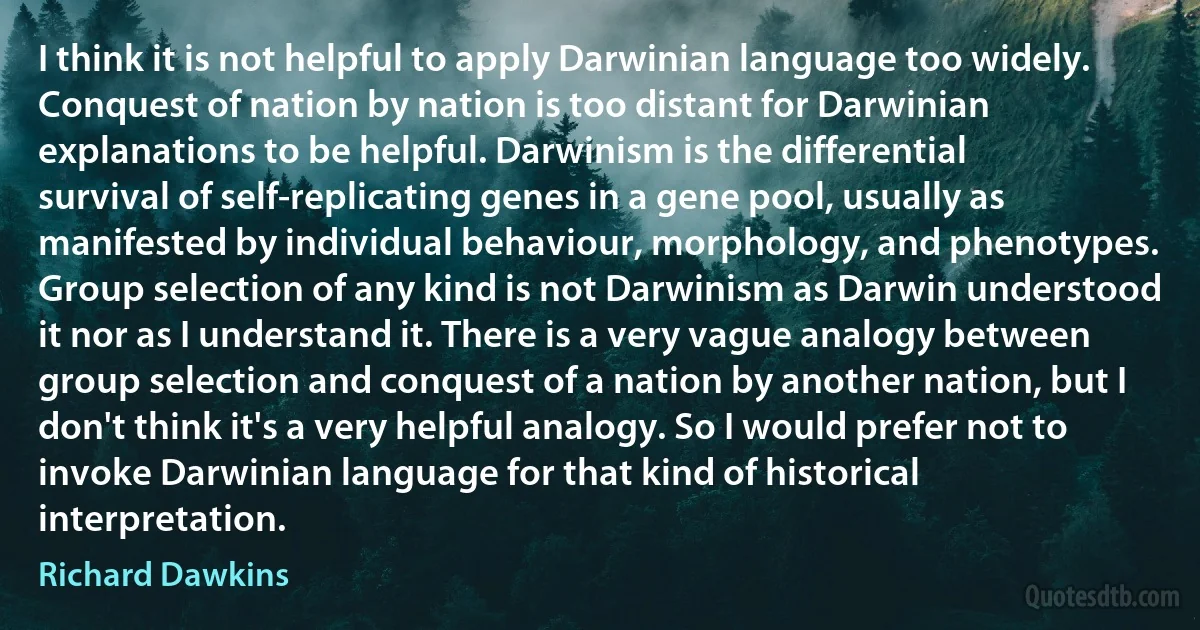Differential Quotes - page 2
Causality applies only to a system which is left undisturbed. If a system is small, we cannot observe it without producing a serious disturbance and hence we cannot expect to find any causal connexion between the results of our observations. Causality will still be assumed to apply to undisturbed systems and the equations which will be set up to describe an undisturbed system will be differential equations expressing a causal connexion between conditions at one time and conditions at a later time. These equations will be in close correspondence with the equations of classical mechanics, but they will be connected only indirectly with the results of observations.

Paul Dirac
The physicist needs a facility in looking at problems from several points of view. The exact analysis of real physical problems is usually quite complicated, and any particular physical situation may be too complicated to analyze directly by solving the differential equation. But one can still get a very good idea of the behavior of a system if one has some feel for the character of the solution in different circumstances. Ideas such as the field lines, capacitance, resistance, and inductance are, for such purposes, very useful. ... On the other hand, none of the heuristic models, such as field lines, is really adequate and accurate for all situations. There is only one precise way of presenting the laws, and that is by means of differential equations. They have the advantage of being fundamental and, so far as we know, precise. If you have learned the differential equations you can always go back to them. There is nothing to unlearn.

Richard Feynman
Libertarians are often baffled at how those who appear so sensitive to constraints on choice, and to differences in bargaining power, when these derive from market factors, become so amazingly oblivious to the constraint on choice, and differential bargaining power, represented by the armed might of the state, empowered to enforce its demands by legalized violence.

Roderick Long
In general the position as regards all such new calculi is this - That one cannot accomplish by them anything that could not be accomplished without them. However, the advantage is, that, provided such a calculus corresponds to the inmost nature of frequent needs, anyone who masters it thoroughly is able - without the unconscious inspiration of genius which no one can command - to solve the respective problems, yea to solve them mechanically in complicated cases in which, without such aid, even genius becomes powerless. Such is the case with the invention of general algebra, with the differential calculus, and in a more limited region with Lagrange's calculus of variations, with my calculus of congruences, and with Mobius's calculus. Such conceptions unite, as it were, into an organic whole countless problems which otherwise would remain isolated and require for their separate solution more or less application of inventive genius.

Carl Friedrich Gauss
First Shakespeare sonnets seem meaningless; first Bach fugues, a bore; first differential equations, sheer torture. But training changes the nature of our spiritual experiences. In due course, contact with an obscurely beautiful poem, an elaborate piece of counterpoint or of mathematical reasoning, causes us to feel direct intuitions of beauty and significance. It is the same in the moral world.

Aldous Huxley
The differential rate system of piece-work consists briefly in offering two different rates for the same job: a high price per piece, in case the work is finished in the shortest time possible and in perfect condition, and a low price, if it takes a longer time to do the job, or if there are any imperfections in the work. (The high rate should be such that the workman can earn more per day than is usually paid in similar establishments.) This is directly the opposite of the ordinary plan of piece-work, in which the wages of the workmen are reduced when they increase their productivity.

Frederick Winslow Taylor
Gradually... during the second half of the nineteenth century, the uncomfortable feeling of dislike of the action at a distance, which had been so strong in Huygens and other contemporaries of Newton, but had subsided during the eighteenth century, began to emerge again, and gained strength rapidly.
This was favoured by the purely mathematical transformation (which can be compared in a sense with that from the Ptolemaic to the Copernican system), replacing Newton's finite equations by the differential equations, the potential becoming the primary concept, instead of the force, which is only the gradient of the potential. These ideas, of course, arose first in the theory of electricity and magnetism or perhaps one should say in the brain of Faraday.

Willem de Sitter
While many of the conflicting claims can be reconciled in terms of the short-run and long-run orientation of Keynesians and monetarists, respectively, and in terms of their contrasting philosophical orientations, neither vision takes into account the workings or failings of the market mechanisms within the investment aggregate.Austrian macroeconomics is set apart from both Keynesianism and monetarism by its attention to the differential effects of interest rate changes within the investment sector, or-using the Austrian terminology-within the economy's structure of production.

Roger Garrison
My dissertation for the Ph. D. degree at the University of Michigan was on applications of vectorial methods to metric geometry (in the sense of the Menger school), especially with a view to the merging of metric geometry in that sense with differential geometry. Professor S B Myers at the University of Michigan sponsored my dissertation, but I was particularly close to R L Wilder there.

Leonard Jimmie Savage
Ours, according to Leibnitz, is the best of all possible worlds, and the laws of nature can therefore be described in terms of extremal principles. Thus, arising from corresponding variational problems, the differential equations of mechanics have invariance properties relative to certain groups of coordinate transformations.

Carl Ludwig Siegel
The minimum principle that unified the knowledge of light, gravitation, and electricity of Hamilton's time no longer suffices to relate these fundamental branches of physics. Within fifty years of its creation, the belief that Hamilton's principle would outlive all other physical laws of physics was shattered. Minimum principles have since been created for separate branches of physics... but these are not only restricted... but seem to be contrived...
A single minimum principle, a universal law governing all processes in nature, is still the direction in which the search for simplicity is headed, with the price of simplicity now raised from a mastery of differential equations to a mastery of the calculus of variations.

Morris Kline
Brook Taylor... in his Methodus Incrementorum Directa et Inversa (1715), sought to clarify the ideas of the calculus but limited himself to algebraic functions and algebraic differential equations. ...Taylor's exposition, based on what we would call finite differences, failed to obtain many backers because it was arithmetical in nature when the British were trying to tie the calculus to geometry or to the physical notion of velocity.

Morris Kline
As is known, scientific physics dates its existence from the discovery of the differential calculus. Only when it was learned how to follow continuously the course of natural events, attempts, to construct by means of abstract conceptions the connection between phenomena, met with success. To do this two things are necessary: First, simple fundamental concepts with which to construct; second, some method by which to deduce, from the simple fundamental laws of the construction which relate to instants of time and points in space, laws for finite intervals and distances, which alone are accessible to observation.

Bernhard Riemann
The main object of study in differential geometry is, at least for the moment, the differential manifolds, structures on the manifolds (Riemannian, complex, or other), and their admissible mappings. On a manifold the coordinates are valid only locally and do not have a geometric meaning themselves.

Shiing-Shen Chern
Not all the geometrical structures are "equal". It would seem that the riemannian and complex structures, with their contacts with other fields of mathematics and with their richness in results, should occupy a central position in differential geometry. A unifying idea is the notion of a G-structure, which is the modern version of an equivalence problem first emphasized and exploited in its various special cases by Elie Cartan.

Shiing-Shen Chern
The statement is so frequently made that the differential calculus deals with continuous magnitude, and yet an explanation of this continuity is nowhere given; even the most rigorous expositions of the differential calculus do not base their proofs upon continuity but, with more or less consciousness of the fact, they either appeal to geometric notions or those suggested by geometry, or depend upon theorems which are never established in a purely arithmetic manner. Among these, for example, belongs the above mentioned theorem, and a more careful investigation convinced me that this theorem, or any one equivalent to it, can be regarded in some way as a sufficient basis for infinitesimal analysis. It then only remained to discover its true origin in the elements of arithmetic and thus at the same time to secure a real definition of the essence of continuity. I succeeded Nov. 24, 1858.

Richard Dedekind
A nonlinear differential equation of the Riccati type is derived for the covariance matrix of the optimal filtering error. The solution of this 'variance equation' completely specifies the optimal filter for either finite or infinite smoothing intervals and stationary or non-stationary statistics.
The variance equation is closely related to the Hamiltonian (canonical) differential equations of the calculus of variations. Analytic solutions are available in some cases. The significance of the variance equation is illustrated by examples which duplicate, simplify, or extend earlier results in this field.
The duality principle relating stochastic estimation and deterministic control problems plays an important role in the proof of theoretical results. In several examples, the estimation problem and its dual are discussed side-by-side.
Properties of the variance equation are of great interest in the theory of adaptive systems. Some aspects of this are considered briefly.

Rudolf E. Kálmán

![If the variables are continuous, this definition [Ashby's fundamental concept of machine] corresponds to the description of a dynamic system by a set of ordinary differential equations with time as the independent variable. However, such representation by differential equations is too restricted for a theory to include biological systems and calculating machines where discontinuities are ubiquitous. (Ludwig von Bertalanffy)](https://cdn.quotesdtb.com/img/quotes_images_webp/36/ludwig-von-bertalanffy-biological-945336.webp)

